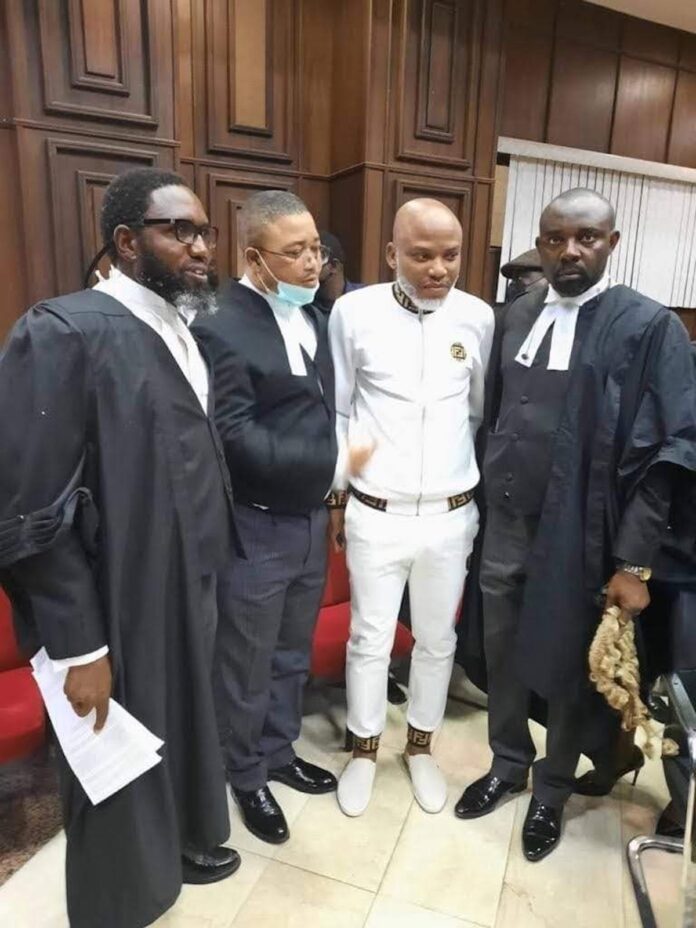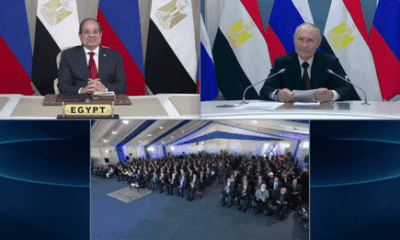National Issues
Judicial Terrorism as State Policy: The Real Meaning of Nnamdi Kanu’s Life Sentence” -By Vitus Ozoke, PhD
But the Igbo must avoid misplacing their anger. Cry not for Kanu. Cry for the useless governors, the collaborators, the saboteurs who sell their people for scraps of presidential favors. Even after Kanu is released, Igbo land will keep serving its sentence until this current group of leaders is exiled from relevance.

Justice Omotosho of the Federal High Court in Abuja has sentenced Mazi Nnamdi Kanu to life imprisonment, and the country is reeling with outrage. Many Nigerians – east of the Niger and beyond – believe this was a gross miscarriage of justice, pointing to procedural flaws, substantive issues, and political motives. They are correct, but perhaps not in the way they think. The problem with Omotosho’s judgment is not just that it was unjust; it is that it was predictably unjust.
So, although these critiques have some validity, a purely doctrinal or procedural view of justice might not be enough to fully explain the outcome. Instead, the judgment needs to be considered within the larger sociopolitical and historical context of Nigerian state formation, intergroup relations, and long-standing patterns of state–Igbo relations.
We must start by asking: What is justice? Conceptually, justice can be viewed through different perspectives. If justice is understood as fairness—in the Rawlsian sense—Justice Omotosho’s decision spectacularly fails the test. If justice is measured as the product of a well-reasoned judicial process grounded in intellectual and legal rationality, then the ruling also falls short. Omotosho’s judgment reads less like jurisprudence from a learned and impartial judge and more like the temper tantrum of a political pawn, barely literate in the law he claims to interpret.
However, when viewed through the lens of pattern consistency – that is, the role of judicial decisions in maintaining entrenched political hierarchies and historical pathways – the judgment is entirely predictable, making Omotosho the most dependable judge in Nigeria. He delivered exactly the outcome the Nigerian state needed, expected, and designed. In the record of pattern justice, Omotosho’s judgment is not a miscarriage – it is a masterpiece. Judicial outputs do not happen in a vacuum; they often follow long-standing sociopolitical patterns.
In this case, Omotosho’s decision aligns with a long-standing pattern of state responses to Igbo political activism, going back to the crises of 1966, the civil war, and the post-war political economy. Omotosho ticked all the boxes, stayed within all the boundaries, and did exactly what the system demanded: uphold the long-standing pattern of Igbo political suffering.
But there is a deeper layer – one that turns Omotosho’s verdict from mere injustice into judicial terrorism. Judicial terrorism involves using courts, not to serve justice, but to intimidate a targeted population into political submission. It is terror carried out in legal guise: violence made to seem respectable through procedural steps; harm inflicted through pages of legal language. Judicial terrorism is the most dangerous form of state violence because it leaves no bloodshed but causes psychological, political, and community paralysis. It sends a message that the system meant to protect them has been weaponized to imprison them. Omotosho’s ruling is therefore not just a legal mistake – it is a calculated display of judicial terror, meant to reinforce the long-standing message that the Igbo may survive, but never be truly free.
Nigeria has, over the decades, perfected a tradition of judicial terrorism against the Igbo—using the courts as a velvet glove to soften the blows of structural repression. From the post-war decrees that economically strangled the Igbo, to the legal validations of discriminatory federal actions, to the repeated detentions of Igbo activists under dubious interpretations of national security, the judiciary has often served as the legal arm of political terror. Omotosho did not innovate; he inherited a template. His life sentence for Kanu is simply the latest chapter in a long-standing effort of state intimidation, whose unspoken rule is clear: the courtroom is not your refuge; it is your warning.
Seen in this way, the judgment functions less as an independent legal decision and more as a continuation of an established state pattern: the containment – not elimination – of Igbo political dissent. Had Omotosho acquitted Kanu, he would have broken a pattern that has remained unbroken since 1966. Had he sentenced Kanu to death, he would have violated another pattern: Nigeria does not kill the goose whose creativity, commerce, and resilience sustain the country. Nigeria needs the Igbo to survive; it simply does not want them to be free. That is why Omotosho delivered the one verdict that both honors and maintains the pattern: a life sentence. An acquittal would have disrupted the pattern by signaling a shift in state posture. A life sentence maintains balance while reinforcing the structural message of containment.
Some Nigerians are upset with Omotosho for being a villain. I am not. Others praise him for “saving the nation from chaos” by refusing to acquit Kanu. I do not. Let’s be clear: Nnamdi Kanu was not the one sentenced to life imprisonment. It is the Igbo nation that has been burdened with another life sentence – one they have been serving since the coup of January 1966, the pogroms of May 1966, the war of 1967–1970, the economic strangulation that followed, the political exclusion that continues, and the security neglect that has become normalized.
So, Omotosho is neither a villain nor a hero. He is simply a functionary – an obedient instrument following a script written long before his birth. That script is clear: Never acquit an Igbo agitator. Never martyr him either. Keep him alive but caged – neutralized yet visible enough to warn others. Omotosho is just the latest courier to deliver a package that has been in transit for 60 years. This is pattern justice, the Nigerian way.
Importantly, this judgment must also be understood within the current political climate of the Southeast. Although the ruling bears Justice Omotosho’s name, its social legitimacy and political significance are shaped by the actions – and inactions – of regional actors. Five governors in the Southeast hold substantial influence over both federal perceptions of security in the region and the fate of political actors like Kanu. Their failure or refusal to present a united moral and political front to the federal government highlights a long-standing internal fragmentation within Igbo political leadership. Structural inequality is often maintained not only by central authorities but also through the complicity, passivity, or strategic silence of regional elites who benefit from the existing system.
So, while many focus on Omotosho, I warn the Igbo: the judge whose name appears on the judgment is not the only one responsible for writing it. Omotosho’s hands may have written and signed the verdict, but five other unseen hands guided his wrist: the five governors of the Southeast. It is a shameful truth, but it must be said: the survival of the Nigerian system of Igbo suppression depends heavily on Igbo collaborators – those who feed fat from the political order that crushes their own people. Every oppressive system in history has depended on saboteurs, and the Igbo have theirs in plenty.
These five governors – weak, compromised, timid, and intoxicated by proximity to federal patronage – stand to gain more from Kanu’s incarceration than Omotosho does. Kanu’s freedom threatens not only the Nigerian state but also the fragile political legitimacy of the governors who govern the Igbo without inspiring them. Had the Southeast governors spoken with the unified moral force expected of leaders with backbone and self-respect, Kanu’s case would not have been so easily manipulated. Silence equals agreement. Their silence was Omotosho’s green light.
So, when you read Omotosho’s judgment, swap his name with five others: Hope Uzodimma, Chukwuma Soludo, Peter Mbah, Francis Nwifuru, and Alex Otti. Among this shameful quintet, you’ll find the chief prosecutor, the master strategist of silence, the federal loyalist-in-chief, the echo of Abuja, and the man who prefers convenience over courage. These are the real authors of Kanu’s life sentence.
But let no one despair. While Nigeria has sentenced the Igbo to life, it forgets one truth: the Igbo are a cat with one trillion lives. They have survived pogroms, wars, economic devastation, political exclusion, and systemic hostility. History shows that the Igbo have repeatedly demonstrated resilience in the face of systemic obstacles. Their sociocultural adaptability, economic vigor, and demographic vitality challenge any attempt at long-term suppression. They will outlive Justice Omotosho, outlive his judgment, outlive the injustice, and outlive the rigged system that sustains it.
In the long run, the Igbo will not remain victims of Nigerian injustice. If anything, the persistence of this injustice pattern threatens not only the Igbo but also the stability of Nigeria itself. Countries that do not address internal inequalities risk losing legitimacy, experiencing civic disengagement, and facing long-term instability.
Don’t worry about Nnamdi Kanu; he will be okay. He is made of a sturdier moral fiber than the men who sit in judgment over him. More importantly, Kanu isn’t dying in prison – whether physically, ideologically, or symbolically. Abuja’s political weasels are just trying to “dirty him up,” as those in power always try to tarnish those who reveal their faults.
But the Igbo must avoid misplacing their anger. Cry not for Kanu. Cry for the useless governors, the collaborators, the saboteurs who sell their people for scraps of presidential favors. Even after Kanu is released, Igbo land will keep serving its sentence until this current group of leaders is exiled from relevance.
Ultimately, the sentencing of Nnamdi Kanu is more than just a legal event. It is a sociopolitical signal – one that confirms a historical pattern while raising important questions about the future of federalism, interethnic fairness, and the legitimacy of Nigeria’s judicial institutions. In the end, there is only one path forward for the Igbo: political clarity, communal unity, and moral courage. The system is consistent; only the Igbo are not. Pattern justice will persist until the Igbo produce pattern resistance – strategic, organized, and unyielding. Justice Omotosho fulfilled his duty. It is now time for the Igbo to fulfill theirs. It’s long overdue.
Dr. Vitus Ozoke is a lawyer, human rights activist, and public affairs analyst based in the United States. He writes on politics, governance, and the moral costs of leadership failure in Africa.










